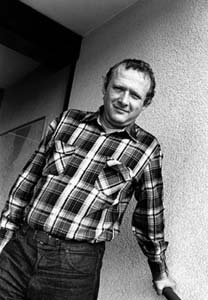Adam Michnik
[2] Michnik played a crucial role during the Polish Round Table Talks, as a result of which the communists agreed to call elections in 1989, which were won by Solidarity.
His step-brother on his mother's side, Stefan Michnik, was a military judge in the 1950s, who passed sentences, including executions, in politically motivated trials of members of Polish anti-Nazi resistance fighters.
Stefan Michnik (who lived in Sweden from 1968 until his death in 2021),[7] was later formally accused of zbrodnie komunistyczne ("communist crimes") by the Polish Institute of National Remembrance.
The crisis was ignited by the ban of Kazimierz Dejmek's adaptation of Adam Mickiewicz's poetic drama Dziady ("Forefathers' Eve") in the National Theatre.
Michnik and another student, Henryk Szlajfer, recounted the situation to a correspondent of Le Monde, "whose report was then carried on Radio Free Europe".
[20] When martial law was declared in December 1981, he was an internee at first, but when he refused to sign a "loyalty oath" and assent to voluntarily leave the country, he was jailed and accused of an "attempt to overthrow socialism".
After the Round Table Talks, Lech Wałęsa told him to organize a big Polish national daily, which was supposed to be an 'organ' of the Solidarity Citizens' Committee, before the upcoming elections.
[23] In the elections to the Contract Sejm on 4 June 1989 he became a member of parliament for Lech Wałęsa's Solidarity Citizens' Committee electoral register, as a candidate for the city of Bytom.
[24] Both as a member of parliament and as editor of Gazeta Wyborcza he actively supported Prime Minister Tadeusz Mazowiecki's government and his candidature in the 1990 presidential election campaign against Lech Wałęsa.
[25] After the breakup of the Citizens' Committee and Mazowiecki's failure, Michnik withdrew from his direct involvement in politics and did not run for a seat in the 1991 parliamentary election, instead focusing on editorial and journalistic activities.
By May 2004, it was one of the biggest media concerns in Poland, administrating 11 monthly titles, the portal gazeta.pl, the outdoor advertising company AMS, and has shares in several radio stations.
Prime Minister Tadeusz Mazowiecki in his exposé in September 1989 began a new, so-called "thick line"attitude to the political history of the recent past.
[26] On 27 December 2002, Adam Michnik and Paweł Smoleński revealed the so-called "Rywin affair" which had to be explained by a specially called parliamentary select committee.
[27] In autumn 2004, due to health problems (he suffered from tuberculosis) he resigned from active participation in editing Gazeta Wyborcza and passed his duties to editorial colleague Helena Łuczywo.
According to Canadian translator and writer Paul Wilson, Adam Michnik "[holds a] core... belief... that history is not just about the past because it is constantly recurring, and not as farce, as Marx had it, but as itself:The world is full of inquisitors and heretics, liars and those lied to, terrorists and the terrorized.


